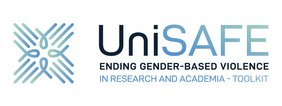At the end of January, the EU-funded UniSAFE project is wrapping up. Within its three-year run, it has been providing higher education institutions and research organizations with a comprehensive set of tools to develop, improve or implement effective policies and procedures to end gender-based violence. In this post we’d like to highlight two outcomes of the project: the UniSAFE toolkit as well as the second European policy brief.
UniSAFE toolkit
Nearly 62% of the over 42,000 respondents who took part in the survey on gender-based violence in academia and higher education carried out in 2022 by UniSAFE disclosed having experienced at least one form of gender-based violence. While research organizations and higher education institutions increasingly acknowledge their institutional responsibility in addressing gender-based violence, setting up effective policies and procedures remains challenging. Where to start? How can institutions promote cultural change? What key elements should a policy include? How should an institution respond to disclosure? How to better protect students and staff? What are some inspiring practices from other institutions in Europe?
The UniSAFE toolkit supports higher education institutions and research organizations in addressing gender-based violence: whether they are just starting to reflect on how to address this issue, designing a policy or are more advanced and seeking to improve an institutional policy or its implementation.
The materials available have been developed within the project or collected from European academic settings and are based on a holistic framework – the 7P model. This framework enables institutions to develop and implement comprehensive policies, covering all aspects including prevalence, prevention, protection, prosecution, provisions of services, and partnerships. The toolkit contents comprise:
- Key findings from UniSAFE’s survey
- Information on legal and policy frameworks at international and national levels
- The 7P framework
- A guide to implementing comprehensive policies
- An action plan for institutions at the early stages of policy development
- Inspiring practices
- Resources and capacity-building materials, including step-by-step guides (to create awareness-raising campaigns, develop a protocol, run co-creation activities…), training materials, webinars, and additional resources to support institutions in their efforts to stop gender-based violence.
The materials developed are based on UniSAFE’s research – a theoretical framework (Mergaert et al., 2023), two sets of policy mappings, a quantitative survey, in-depth interviews with victims/survivors, and institutional case studies. Additionally, nine workshops were run between November 2022 and June 2023 with researchers and experts to gather input for the development of tools to address and stop gender-based violence in higher education and research organizations.
You can find the UniSAFE toolkit here: https://unisafe-toolkit.eu
Second European policy brief
The results and recommendations produced by UniSAFE directly contribute to the knowledge base underlying policy developments while shedding light on the differences in policy across the EU and identifying gaps and shortcomings in institutional policies to comprehensively address the issue.
UniSAFE’s second European policy brief specifically addresses the following areas:
- Evidence and analysis
- Policy implications and recommendations
- Sustainability and legacy
- Project objectives and methodologies
You can download the full policy brief here: https://zenodo.org/records/10605043
UniSAFE project page within the CEWS portal: https://www.gesis.org/en/cews/projects/current-projects/unisafe

